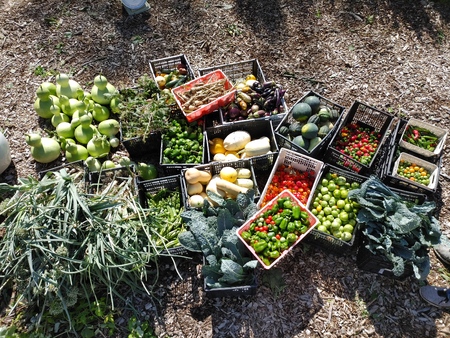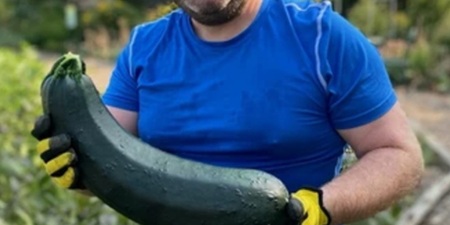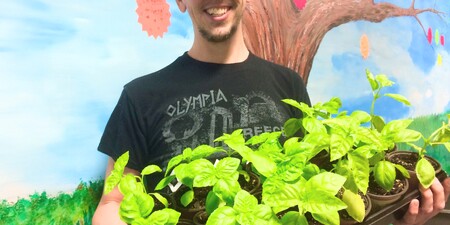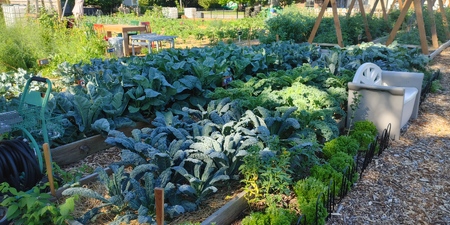
Growing in Kane: Charity Blooms – Feeding Families, Cultivating Community
Kane County Connects is spotlighting local farms that received grants through Kane County’s 2024 Food and Farm Resiliency Program. Funded by the federal American Rescue Plan, the program supports farmers as they continue to recover from pandemic-related challenges and work to strengthen the region’s food system.
Meet the Farmers
At Charity Blooms, generosity grows in every row. This all-volunteer, nonprofit urban farm is located at 835 N. Highland Avenue, directly across from Marie Wilkinson Food Pantry in Aurora.
Charity Blooms is built on a radical model: Donate everything harvested, with no sales, no paid staff, and no barriers to access. Since 2018, President Robert Vaughan and dedicated board members and volunteers have transformed a once-vacant lot into a thriving hub of food production, education, and belonging.
“Although we are not a large organization with a million-dollar budget, we are making a massive impact," explained Vaughan. “Anyone who wants our vegetables and herbs is welcome to take them without question or qualification."
Growing for Kane
Charity Blooms grows over 100 varieties of herbs and vegetables, emphasizing culturally relevant crops that reflect the needs of Kane County's growing immigrant and refugee populations. They prioritize ethnic varieties and items not commonly available from the Northern Illinois Food Bank.
“In 2025, we will expand our focus on ethnic foods and herbs," Vaughan said. “We're already sourcing new seed varieties to meet the evolving needs of our community."
While sourcing culturally relevant seeds is commendable, the ability to raise prize-winning crops to maturity is a true accomplishment. In 2022, Charity Blooms received 27 awards for their produce at the renowned Sandwich County Fair.
“We wanted to show everyone that we were donating award-winning produce to the food pantry," noted Vaughan.
Why Kane County
The farm has become one of Aurora's best-kept secrets: a place where neighbors gather, eat, learn, and grow.
With a 500-square-foot greenhouse, solar-powered infrastructure, outdoor kitchen, pollinator gardens, monarch butterfly habitat, and entertainment space for 32, the half-acre site is as much a social sanctuary as a food source.
“People of all ages and backgrounds gather here to learn, help, and play," Vaughan said. “Our community now relies on us, and we are ready to grow to meet the need."
What's New for 2025
When asked how the Food & Farm Resiliency Grant has impacted the farm, Vaughan explained that while they don't typically qualify for large federal grants, this unique opportunity helped them to invest in infrastructure and capital improvements.
“By putting the grant funding toward gardening tools, potting soil, seeds, and other needs, we were able to invest our donations in a climate-controlled greenhouse, a social media presence, and creating a more accessible environment for our volunteers and visitors," he said.
In 2025, interested volunteers do not need experience to work on the farm. Charity Blooms provides gloves, tools, water, and warm welcomes to helpers of all ages. Farm duties include weeding, watering, harvesting, and group project days.
Where to find Charity Blooms Produce in 2025
The land that is now Charity Blooms was once home to five houses. After they were demolished in 2014, the City of Aurora and Marie Wilkinson Food Pantry generously designated the space for community use. By 2018, Charity Blooms took root and has since grown into a productive, welcoming place to feed hungry neighbors.
Over the past seven years, the farm has donated more than 24,000 pounds of fresh food, mostly to the Marie Wilkinson Food Pantry, with additional donations going to the Well Child Center and in-farm cooking classes. In 2025 alone, they've already grown 105 pounds of produce, with the help of 73 volunteers, and the season is just getting started.
To learn more about engaging with Charity Blooms, visit their website at www.charityblooms.org/
The Growing for Kane series was created by Sustainable Agriculture Consultant Ellen Kamps.




